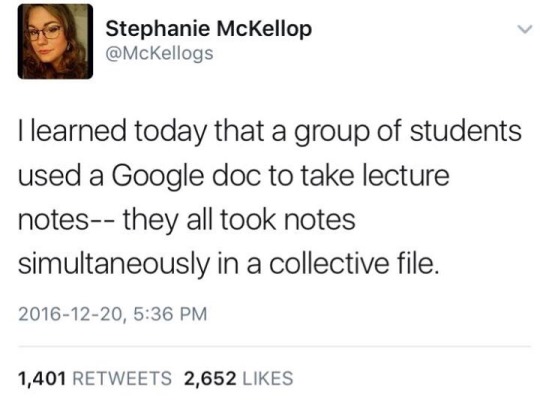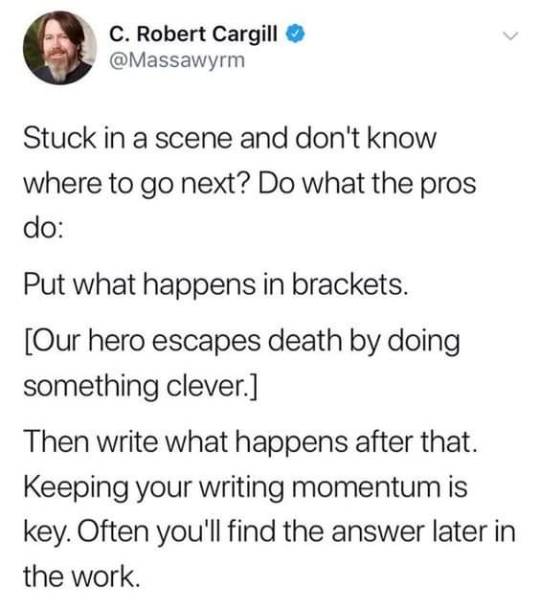Text
when you find an academic source that’s perfect for your paper but it’s behind a pay wall

218K notes
·
View notes
Text
OH MY GOD whyyyy did no one tell me you’re supposed to send thank-yous after interviews?? Why would I do that???
“Thank you for this incredibly stressful 30 minutes that I have had to re-structure my entire day around and which will give me anxiety poos for the next 24 hours.”
I HATE ETIQUETTE IT’S THE MOST IMPOSSIBLE THING FOR ME TO LEARN WITHOUT SOMEONE DIRECTLY TELLING ME THIS SHIT
444K notes
·
View notes
Text
The reality of language learning
I’ve been thinking about writing this post for a while, considering how much I struggled with Russian and Czech (and inevitably failed) and how much I still struggle with German.
A lot of beginners get sold into this naively optimistic view promulgated by so many ‘internetesque’ polyglots: that language learning is easy and quick to do. Of course it’s appealing to think that even you could be fluent in three months; just like Benny Lewis! However, you will come to realise [hopefully] that these are mere marketing tricks to try and get you to purchase their products, peruse their websites, or boost their ego.
As you start progressing through the beginner’s stage you reach a point of enlightenment in which you realise that language learning is not just ‘okay so I learn a couple of thousand words, maybe like 30 a day, go through a quick grammar book and ta-da I’ve achieved linguipotence! Should take like a few months right?’. It’s so much more than that, and probably one of the most complex interests/skills you can ever develop.
And as time goes on, even more of your preconceptions start to fade away. You think you’re going to understand everything in your target language? That’s an ocean which you’ll never traverse… do you know the English word ‘melopoeia’ for example - probably not (it means “the art of composing melodies”). Even in your native language you possess gaps in your lexicon, and these gaps will be even greater in your target language.
You think you’ll be able to learn 30 words a day, every day, without it ever becoming a burden? I admire you if you can do that, but at the beginning this is a great deal to ask from someone, as trying to learn 210 words in a week in a language you have never studied before is an astronomical task for your brain. More importantly, there will be words you’ve encountered in your target language before which you’ll forget if you don’t use them after a while.
And with regards to grammar, you will never realise what a monumental task merely trying to use a verb is (which person, which voice, which mood, which conjugation, does this need a prefix?, is this verb synonymous) until you attempt to do so. Grammar is no easy feat in language learning either.
So some down-to-earth tips for the beginner:
- It is not a race. Do not expect to learn the whole language in a few months, and lose the notion of learning ‘everything’.
- Do not listen to the internet polyglots who have some form of ulterior motive; many of them out there have genuine, good, linguistic skills, but they are often overshadowed by the beguiles from false prophets.
- Do not get ahead of yourself. Do not think that you can learn the entirety of one new grammar topic each day, or 30 words in a day, or perfect pronunciation in a day. Take it one step at a time.
- Push through the wall. Such a common occurrence in the uptaking of new hobbies is the part where it sucks because you’re awful and struggle to do basic things in said new hobby. You have to push through this; you can only get better by continuously trying, and you’ll only get worse by not trying (trust me, as someone who has tried and given up on three languages).
I see so, so many new people in the langblr community who have recently gained an interest in learning languages and state they’re learning “French, Manx, Gothic, Portugese, Ancient Greek, Greenlandic, Finnish, and Swiss German”. And time after time I just want to scream at them ‘slow the fuck down’. It’s so easy to get caught up in the delirium of adding as many languages to your repertoire as possible, but if you actually sit there and think how hard it is to learn one extra language, it should bring you down to Earth.
Posessing extra languages are clearly important desiderata for many people, and I feel it’s important to start one’s language learning journey with some clear perspective on how it will actually be. Nothing is ever full of roses, and it will be hard, but it will be worth it. Rome wasn’t built in a day.
2K notes
·
View notes
Photo


This is a summary of college only using two pictures; expensive as hell.
That’s my Sociology “book”. In fact what it is is a piece of paper with codes written on it to allow me to access an electronic version of a book. I was told by my professor that I could not buy any other paperback version, or use another code, so I was left with no option other than buying a piece of paper for over $200. Best part about all this is my professor wrote the books; there’s something hilariously sadistic about that. So I pretty much doled out $200 for a current edition of an online textbook that is no different than an older, paperback edition of the same book for $5; yeah, I checked. My mistake for listening to my professor.
This is why we download.
Alternatives to buying overpriced textbooks
Textbooknova
Reddit
Bookboon
Textbookrevolution
GaTech Math Textbooks
Ebookee
Freebookspot
Free-ebooks
Getfreeebooks
BookFinder
Oerconsortium
Project Gutenberg
1M notes
·
View notes
Text
Test your listening proficiency

Here’s another test from LanguageTrainers.com, which tests elementary and intermediate listening levels in the following languages:
Arabic
Chinese
Danish
Dutch
English
French
German
Greek
Hebrew
Italian
Japanese
Korean
Norwegian
Portuguese
Russian
Spanish (European)
Spanish
Swedish
Turkish
They also have a written, multiple choice test available here, which I talk about here.
7K notes
·
View notes
Photo


Meanwhile on Twitter | https://twitter.com/mckellogs/status/811339472205910016
143K notes
·
View notes
Text
writing a paper: too perfectionist to do a shitty job too exhausted to do a good job
87K notes
·
View notes
Photo


These are some of my tips in dealing with boring classes. Sometimes, it’s you. Sometimes, it’s the teacher. This might not apply to everybody but I thought that it could at least help someone. Thanks for reading anyway and have a nice day!
Check out my other posts!
7K notes
·
View notes
Photo

binders
i personally use a binder for every class except one (mostly bc i like binders and some teachers require them hehe) you could decorate it to make it pretty or put useful guides in the clear cover pocket so you can glance at your binder rlly quickly before a test starts. anyways, some problems with binders are that papers often get shoved in without a single thought or the holes rip.
use plastic pocket tab dividers.
they should sell these at your average store. they’re basically tab dividers that have pockets to put stuff in. this can be very helpful for the things that you get that aren’t already hole-punched or you can’t hole punch them.
you should divide your binder up into categories such as homework, handouts, notes, etc. it makes your binder so much neater and helps you find things faster too.
get a hole-puncher
it is a pain to drag around a binder filled with unpunched papers and even if you do have pocket tab dividers, they have their limits. i have a portable 3 hole-puncher that you can place on your binder rings and it was like $2 usd.
if it’s something that you can hole-punch (margins are big enough, you can keep the thing, you want it in your binder, etc), then hole-punch it and stick it in before you lose it.
label your binder
most binders have a pocket on the spine. make a paper strip that fits the size and label that thing. all of my binders are white, so it’s difficult for me to tell which one is which right away. labels help so so much. put your name, class, period, and fun doodles on it if you wish.
folders
downside of binders: they can get heavy
how to fix that: i use folders
folders are great for classes that don’t require a lot of handouts, assignments, etc. i carry around folders for subjects like math and then file graded assignments and what not into a binder at home. this is so so much lighter than carrying 219246321 binders / expandable files.
as for me, i just carry around a general “homework” folder that has notebook paper, graph paper, and my homework. i find that it’s helpful to have all of my homework in one place, but tbh having a folder for each subject is probably more organized hehe. i have separate folders for classes like ap hugs or principles of design, tech, and engineering because the amount of handouts i get from those classes clutters up my homework folder.
pls pls for ur sanity, label your folders. get different colors or something. figure out a way to quickly differentiate between your calculus folder and your chemistry folder. it would be terrible to go to class and realize that you brought your literature folder instead of your math folder or something.
expandable files
these are like the mom of folders; folders upgraded; a family of folders
the nice thing about these is that you don’t have to get anything hole-punched, you already have stuff divided + tabs for you, and it’s pretty easy to organize.
some people like having one expandable file for their entire day while others like to have one for each subject. it all depends on you and your preferences.
it’s kinda like organized shoving.
graded homework? shove it in tab 3. syllabus? shove it in tab 1.
just make sure that you don’t shove stuff in with too much excitement (or laziness or you just want to get out of that class sooner) because the papers can get wrinkled and all folded up and possibly ripped. and nobody likes that, right?
i personally didn’t like it bc i was too lazy to undo the little loop thing and open the thing up bahahahhaha. also, i think i would’ve broken the loop at one point during the school year. but it’s portable, it’s easy to use, and there’s not much to fuss about it.
hope this helped and good luck! if you’d like to request a post, go here and if you’d like to see more helpful posts, go here!! thanks :)
2K notes
·
View notes
Text
some more language learning techniques
repeat exposure
find a news website in your target language and pick a story. make note of any words you don’t know or that you think are important. then, look for previous articles about this story (or any related articles which are usually linked on that same page).
often times, you will see many repeated vocab words. as you follow the evolution of the story, the repeat exposure to vocab words helps you learn faster and more naturally, as well as gain better reading comprehension skills.
150 notes
·
View notes
Text
You are not just studying for your future.
You are studying to save those patients.
You are studying to save that family’s mother from a lengthy jail sentence.
You are studying to teach us all.
You are studying to improve global communication.
You are studying to improve the environment.
You are studying so we learn from the past.
You are studying so technology progresses.
Who ever you are and whatever your goals are.
Your decision to study will change the world.
Literally.
326K notes
·
View notes
Text
Online Spanish Tests
The issue with many internet tests is that they don’t test your speaking ability. Also they may test you on vocabulary that is unrelated to what you have been studying so far. Nevertheless, it can be immensely helpful to find out what your level is, even if it’s only a rough approximation. Below is a list of tests that are free to take online.
Lengalia Placement Test
Advantage: Your ‘grade/score’ will be one of the 6 levels in the Common European Framework of References for Languages (CEFR). As this framework is internationally recognized and used, once you have a rough idea of what your level is, you will be able to compare your level with those of Spanish courses offered all over Europe.
Transparent Proficiency Test
You have to submit your email to the website to receive your full score breakdown an view which answers you got wrong/correct answers (it only takes 20 secs). You cannot save your progress. You will be classed as either beginner/intermediate/advanced. Advantage: Unlike many tests, the reading comprehension section does not ask you to read one large chunk of test but rather four short passages and some are only a few lines. Disadvantages: The text in the reading section is very academic. I’m sure that there are some native speakers who would struggle to comprhend the Don Quixote passage included, for example. This tests vocabulary, grammar and reading comprehension ability only. The grammar section tests a good range of concepts but the vocabulary section is too short to be thorough in my opinion, The test takes about 45 minutes to do (the reading comprehension part will probably take you 20 of those minutes).
Don Quijote Test
“The test consists of 50 questions divided into 6 levels from beginner to advanced.The questions are primarily based on grammar competency. We understand that this is not the only parameter to count when we evaluate language proficiency, but to have a written or oral test in this format is not possible.There is also an explanation given for the sentences that are incorrect.”
Cervantes Spanish Language Test
The Cervantes Spanish language test has 53 questions (all multiple choice) divided into 5 levels from the Common European Framework of Languages, from beginners (A1) to advanced (C1).
American National Spanish Examinations
Practice exercises for reading and listening
Past Papers for grammar, vocabulary, reading and listening
These are the most widely used tests of Spanish in the United States. In the spring of 2015, a total of 157,702 students participated in the online version of the exam.There are six levels and a set of clear grammar targets accompanies each one. Reading through these specifications and comparing them to your own knowledge could be another way of assessing your ability.
Centro Virtual Cervantes Test
This test has been curated by the prestigious Instituto Cervantes- the authority on the Spanish language in Spain. It tests your knowledge on vocabulary and sentence structure as well as listening and reading comprehension. It is the longest of the tests I’ve mentioned but also likely to be the most accurate in deciding your CEFR level.
529 notes
·
View notes



